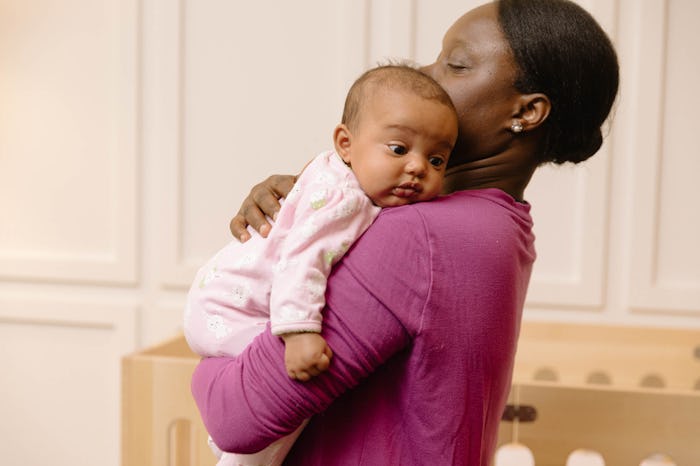If you're new to parenting, the art of burping may feel intimidating. While some babies only require a few light pats to get rid of that excess air, others need more frequent, and even more forceful, love taps to get the job done. And since newborns are so tiny, even the thought of burping can be terrifying. Thankfully, if you follow some guidelines and pay attention to the things you shouldn't do in order to get a baby to burp, you'll be a seasoned pro in no time.
According to Parents, "a burp is the release of gas bubbles up the esophagus and out of the mouth." The American American Academy of Pediatrics (AAP) recommends burping your baby regularly, even if your baby doesn't show discomfort or release any gas when you burp him or her, in order to prevent gas bubbles from getting stuck in your baby's stomach and, as a result, causing an uncomfortable feeling of fullness. Erika Landau, M.D., a pediatrician in New York City and coauthor of The Essential Guide to Baby's First Year, tells Parents, "We do not know how much air gets in their little stomachs, so it is a good idea to burp the babies even if they do not get to the fussy stage."
When you're just getting started, you'll likely feel timid. First, know that it's extremely typical to be afraid to burp your baby. After all, they're tiny! Second, know that the AAP provides burping guidelines any new parent can follow. And last, but certainly not least, make sure you avoid the following:
Put Them In A Dangerous Position
KidsHealth.org suggests a few different positions to try that are safe and effective. You can sit upright with the baby close to your chest, positioning his or her chin on your shoulder. Or you can help your baby sit up in your lap or over your knee, fully supporting baby's head with your palm while leaning them forward and as you use your other hand to gently pat their back. Finally, as long as the baby's head and neck is supported, you can burp them while they're on your lap, on their stomach.
What you shouldn't do is hang your baby upside down, contort them into unsafe positions, or lay them in a spot where they could fall. No matter what position you choose, always support your baby's head and neck.
Press Too Hard
It's true that sometimes, in order to coax that gas out of your little baby's belly, you need a firm hand. Gentle, to be sure, but firm. Remember: nothing about your touch should be painful. Today's Parent suggests carefully massaging your baby's stomach to help move the air trapped inside up, then out. Regardless, if your patting seems to cause more distress than relief, back off the pressure and your baby a break before you try again.
Give Them Unapproved Medicines
The AAP estimates that nearly 20 percent of babies experience colic between two and four weeks after they're born. Colic is, according to WebMD, something of a mystery, but "applies to any healthy, well-fed infant who cries more than three hours a day, more than three days a week, for more than three weeks." While the exact cause is unknown, gas is known to be a potential culprit.
There are over-the-counter aids, like Gripe Water, that are said to help treat gassy babies. While most are generally considered safe, you should never give your gassy baby something you haven't first discussed with a trusted pediatrician. A newborn's digestive tract is highly sensitive and certain medicines might not only be safe for their overall health, but could potentially make the problem worse.
Force Them To Finish A Feeding
Rosemary Shy, MD, FAAP, and Assistant Professor of Pediatrics at the Children’s Hospital of Michigan, tells Babble that a baby's stomach is roughly the size of a "golf ball." That obviously has an effect on how much food they can take it at any given time. In other words, never force-feed your baby or encourage them to eat more than their little tummy can handle.
Shake Them
The National Center for Shaken Baby Syndrome explicitly states that the number one trigger for shaken baby syndrome is crying, and is the leading cause of physical child abuse. A reported 25 percent of babies who are shaken end up dying from the internal injuries. If your baby is gassy and failing to produce a burp, it's important you stay calm and never, ever, take your frustration out on your baby. Doing things like bouncing the baby on your knee to burp them won't cause the kind of head trauma that violently shaking your baby would.
Bottom line: Shaking your baby won't help them burp, but may injure, or even kill, them.
Check out Romper's new video series, Bearing The Motherload, where disagreeing parents from different sides of an issue sit down with a mediator and talk about how to support (and not judge) each other’s parenting perspectives. New episodes air Mondays on Facebook.
